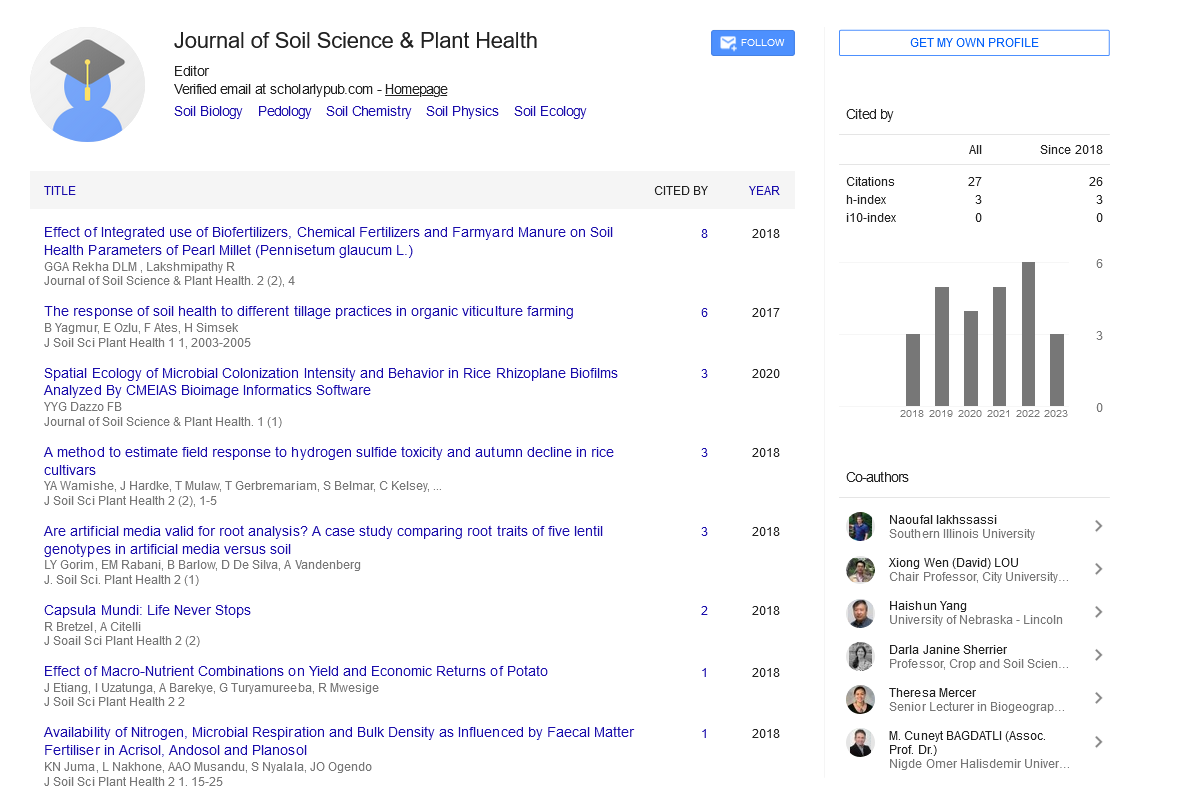Commentary, Vol: 7 Issue: 4
Applied Pedology: Soil Management for Improved Agriculture
Abubakar Msigwa*
1Department of Crop Science and Horticulture, College of Agricultural Sciences and Technology (CoAST), Mbeya University of Science and Technology (MUST), Mbeya, Tanzania
*Corresponding Author: Abubakar Msigwa,
Department of Crop Science and
Horticulture, College of Agricultural Sciences and Technology (CoAST), Mbeya
University of Science and Technology (MUST), Mbeya, Tanzania
E-mail: Abubakar@must.ac.tz
Received date: 31 July, 2023, Manuscript No. JSPH-23-113259;
Editor assigned date: 02 August, 2023, PreQC No. JSPH-23-113259 (PQ);
Reviewed date: 16 August, 2023, QC No. JSPH-23-113259;
Revised date: 23 August, 2023, Manuscript No. JSPH-23-113259 (R);
Published date: 30 August, 2023, DOI:10.4172/jsph.1000201
Citation: Msigwa A (2023) Applied Pedology: Soil Management for Improved Agriculture. J Soil Sci Plant Nutr 7:4.
Description
Soil, often referred to as the "skin of the Earth," is a complex and dynamic component of our environment. It serves as the foundation for agriculture, supporting the growth of crops that feed the world's growing population. In the realm of soil science, the sub-discipline known as pedology plays a pivotal role in understanding soil properties, their formation, and how they can be managed to enhance agricultural productivity. This essay delves into the realm of applied pedology and its significance in soil management for improved agriculture. Pedology, a branch of soil science, is concerned with the study of soils and their properties. It seeks to unravel the intricate processes that govern soil formation, development, classification, and how these properties affect plant growth. Applied pedology, in particular, focuses on the practical application of pedological knowledge to optimize soil use in agriculture.
Soil formation and classification
Soil formation is a complex process that involves the interaction of various factors, including parent material, climate, topography, organisms, and time. Pedologists investigate these factors to gain insights into how different types of soils are formed. Understanding soil formation is crucial because it helps farmers and land managers make informed decisions about which crops to grow and how to manage their soils effectively. Soil classification, another integral aspect of pedology, involves categorizing soils into different groups based on their properties. This classification system aids in identifying the unique characteristics of soils, which is vital for tailoring soil management practices to suit specific agricultural needs. For example, the USDA Soil Taxonomy system in the United States classifies soils into various orders, suborders, and soil families based on criteria such as texture, color, and mineral content.
Soil properties and their significance in agriculture
Applied pedologists assess a range of soil properties, each of which can significantly impact agricultural productivity:
Soil texture: The relative proportions of sand, silt, and clay in the soil determine its texture. Soils with a balanced texture (loam) are generally considered ideal for agriculture as they provide good water retention, aeration, and nutrient-holding capacity.
Soil pH: Soil acidity or alkalinity (pH) influences nutrient availability and microbial activity. Applied pedologists often recommend pH adjustments through practices like liming to optimize crop growth.
Soil fertility: Soil fertility is a crucial factor in agriculture. Pedologists assess nutrient content and develop fertilization strategies to ensure that crops receive adequate nutrients for healthy growth.
Soil structure: The arrangement of soil particles affects water infiltration, root penetration, and aeration. Applied pedology offers techniques for improving soil structure through practices like tillage and organic matter incorporation.
Soil erosion: Pedologists study soil erosion processes and advise on erosion control measures, such as contour farming and terracing, to protect agricultural lands.
Soil waste: Proper soil waste is essential to prevent waterlogging, which can damage crops. Pedological insights help design effective waste systems.
Soil conservation: Applied pedology emphasizes sustainable practices to prevent soil degradation, such as no-till farming and cover cropping.
Challenges and future directions
While applied pedology has made significant contributions to agriculture, it faces challenges in the era of climate change and increasing global food demand. Climate variability and extreme weather events pose new challenges for soil management, requiring ongoing research and adaptation. Additionally, the sustainable use of soil resources is a pressing concern, necessitating the development of innovative techniques for soil conservation and fertility enhancement.
Applied pedology is a critical field within soil science that contributes significantly to improved agriculture. By delving into soil formation, classification, and properties, applied pedologists offer practical solutions to enhance soil management and agricultural productivity. As we confront the challenges of a changing climate and increasing global food demand, the knowledge and practices derived from applied pedology will continue to play a pivotal role in ensuring food security and sustainable land use. Soil, often overlooked, remains one of our most valuable resources, and applied pedology is the key to unlocking its full potential for a more resilient and productive agricultural future.
 Spanish
Spanish  Chinese
Chinese  Russian
Russian  German
German  French
French  Japanese
Japanese  Portuguese
Portuguese  Hindi
Hindi 